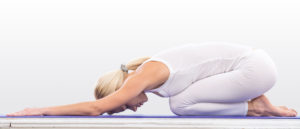Mood and Anxiety Disorders are Not Improved by Yoga Practice
By John M. de Castro, Ph.D.
“Many in the medical community have had a bias toward medication, because until recently that’s what was most well studied. But attitudes are changing. Some of my patients struggle with anxiety, but I rarely prescribe medications. I feel more comfortable prescribing holistic modalities like yoga.” – Jennifer Griffin
Anxiety disorders are the most common mental illness in the United States, affecting 40 million adults, or 18% of the population. A characterizing feature of anxiety disorders is that the suffer overly identifies with and personalizes their thoughts. The sufferer has recurring thoughts, such as impending disaster, that they may realize are unreasonable, but are unable to shake. Indeed, Mindfulness practices have been shown to be quite effective in relieving anxiety. Clinically diagnosed depression affects over 6% of the population. Depression can be difficult to treat. Fortunately, Mindfulness training is also effective for treating depression.
Anxiety disorders and clinical depression have generally been treated with drugs. But, there are considerable side effects and these drugs are often abused. There are a number of psychological therapies for anxiety. But, about 45% of the patients treated do not respond to the therapy. So, there is a need to develop alternative treatments. Recently, it has been found that mindfulness training can be effective for anxiety disorders and for depression either alone or in combination with other therapies. Yoga practice is a mindfulness training and has the added benefit of being an exercise which has been also found to be effective for anxiety and depression.
In today’s Research News article “Hatha yoga for acute, chronic and/or treatment-resistant mood and anxiety disorders: A systematic review and meta-analysis.” (See summary below or view the full text of the study at: https://www.ncbi.nlm.nih.gov/pmc/articles/PMC6166972/ ), Vollbehr and colleagues review, summarize, and perform a meta-analysis of the published research literature on the effectiveness of yoga practice for chronic clinical anxiety and depression disorders. They found 18 randomized controlled trials of yoga interventions in adult clinical samples with mood and anxiety disorders.
They looked only at carefully controlled research studies and did not find significantly greater improvements in either anxiety or depression after yoga practice in comparison to active control conditions. So, although yoga practice has been shown to have a multitude of benefits for health and ill individuals, the published research does not support the use of yoga practice over treatment as usual for chronic clinical depression and anxiety disorders.
“Multiple studies now confirm what countless yoga practitioners have found: Whether we’re dealing with acute stress like childbirth or struggling with longer-term stress and anxiety, yoga can be a powerful tool to calm our nervous systems.” – Seth Gillihan
CMCS – Center for Mindfulness and Contemplative Studies
This and other Contemplative Studies posts are also available on Google+ https://plus.google.com/106784388191201299496/posts and on Twitter @MindfulResearch
Study Summary
Vollbehr, N. K., Bartels-Velthuis, A. A., Nauta, M. H., Castelein, S., Steenhuis, L. A., Hoenders, H., & Ostafin, B. D. (2018). Hatha yoga for acute, chronic and/or treatment-resistant mood and anxiety disorders: A systematic review and meta-analysis. PloS one, 13(10), e0204925. doi:10.1371/journal.pone.0204925
Abstract
Background
The aim of this study was to systematically investigate the effectiveness of hatha yoga in treating acute, chronic and/or treatment-resistant mood and anxiety disorders.
Methods
Medline, Cochrane Library, Current Controlled Trials, Clinical Trials.gov, NHR Centre for Reviews and Dissemination, PsycINFO and CINAHL were searched through June 2018. Randomized controlled trials with patients with mood and anxiety disorders were included. Main outcomes were continuous measures of severity of mood and anxiety symptoms. Cohen’s d was calculated as a measure of effect size. Meta-analyses using a random effects model was applied to estimate direct comparisons between yoga and control conditions for depression and anxiety outcomes. Publication bias was visually inspected using funnel plots.
Results
Eighteen studies were found, fourteen in acute patients and four in chronic patients. Most studies were of low quality. For depression outcomes, hatha yoga did not show a significant effect when compared to treatment as usual, an overall effect size of Cohen’s d -0.64 (95% CI = -1.41, 0.13) or to all active control groups, Cohen’s d -0.13 (95% CI = -0.49, 0.22). A sub-analysis showed that yoga had a significant effect on the reduction of depression compared to psychoeducation control groups, Cohen’s d -0.52 (95% CI = -0.96, -0.08) but not to other active control groups, Cohen’s d 0.28 (95% CI = -0.07, 0.63) For studies using a follow-up of six months or more, hatha yoga had no effect on the reduction of depression compared to active control groups, Cohen’s d -0.14 (95% CI = -0.60, 0.33). Regarding anxiety, hatha yoga had no significant effect when compared to active control groups, Cohen’s d -0.09 (95% CI = -0.47, 0.30). The I2and Q-statistic revealed heterogeneity amongst comparisons. Qualitative analyses suggest some promise of hatha yoga for chronic populations.
Conclusions
The ability to draw firm conclusions is limited by the notable heterogeneity and low quality of most of the included studies. With this caveat in mind, the results of the current meta-analysis suggest that hatha yoga does not have effects on acute, chronic and/or treatment-resistant mood and anxiety disorders compared to treatment as usual or active control groups. However, when compared to psychoeducation, hatha yoga showed more reductions in depression. It is clear that more high-quality studies are needed to advance the field.
https://www.ncbi.nlm.nih.gov/pmc/articles/PMC6166972/
